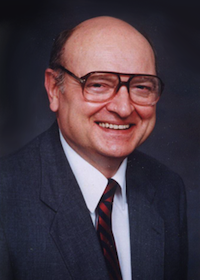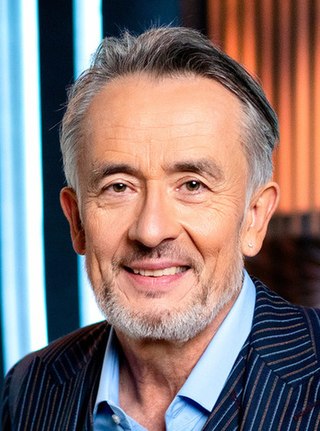
Jürgen Habermas is a German philosopher and social theorist in the tradition of critical theory and pragmatism. His work addresses communicative rationality and the public sphere.

Oswald von Nell-Breuning was a Roman Catholic theologian and sociologist.
The social market economy, also called Rhine capitalism, Rhine-Alpine capitalism, the Rhenish model, and social capitalism, is a socioeconomic model combining a free-market capitalist economic system alongside social policies and enough regulation to establish both fair competition within the market and generally a welfare state. It is sometimes classified as a regulated market economy.

Norbert Blüm was a German politician who served as a federal legislator from North Rhine-Westphalia, chairman of the CDU North Rhine-Westphalia (1987–1999), and Minister of Labour and Social Affairs.

Friedrich Pollock was a German social scientist and philosopher. He was one of the founders of the Institute for Social Research in Frankfurt am Main, and a member of the Frankfurt School of neo-Marxist theory.

Elmar Altvater was Professor of Political Science at the Otto-Suhr-Institut of the Free University of Berlin, before retiring on 30 September 2004. He continued to work at the institute, and published articles and books.

Sankt Georgen Graduate School of Philosophy and Theology is a higher education Jesuit college in Frankfurt am Main, Germany.

Participatory justice, broadly speaking, refers to the direct participation of those affected most by a particular decision, in the decision-making process itself: this could refer to decisions made in a court of law or by policymakers. Popular participation has been called "the ethical seal of a democratic society" by Friedhelm Hengsbach, a professor of Christian Social Science and Economic and Social Ethics at the Philosophical-Theological College Sankt Georgen in Frankfurt and "the politics of the future" by Gene Stephens, professor of criminology at the University of South Carolina. It is about people and relationships.

Aloys Grillmeier was a German Jesuit priest, theologian and cardinal-deacon of the Catholic Church. Pope John Paul II created him cardinal-deacon of San Nicola in Carcere on 26 November 1994.
Nikolaos R. Xionis is Professor of Systematic Theology in the Faculty of Theology of the National and Kapodistrian University of Athens. Born in Volos, he studied theology at the Aristotle University of Thessalonica. He pursued postgraduate studies at the Jesuit Sankt Georgen Graduate School of Philosophy and Theology at Frankfurt and at the Centre for Eastern Christian Studies in Ratisbon.

Jürgen Banzer is a German politician. He is a representative of the German Christian Democratic Union and minister for work, family and health in the administration of Roland Koch in Hesse.

Munich School of Philosophy is a small Jesuit higher education college in Munich, Germany founded in 1925.
Michael Stafford Northcott is Professor Emeritus of Ethics at the University of Edinburgh, Scotland. He is best known for his contributions to environmental theology and ethics.

Ronald H. Nash was a philosophy professor at Reformed Theological Seminary. Nash served as a professor for over 40 years, teaching and writing in the areas of worldview, apologetics, ethics, theology, and history. He is known for his advocacy of Austrian economics, and his criticism of the evangelical left.
Friedrich Diedrich was a German Roman Catholic theologian and Old Testament scholar. He lived in Buer.
Raymond Helmick, SJ was an American Jesuit, peacemaker, theologian and author. Helmick worked as a professor at Boston College and the Boston Theological Institute. Helmick travelled around the world as an emissary for peace. Helmick founded the US Interreligious Committee for Peace in the Middle East.
Erwin Bischofberger, SJ was a Swedish Jesuit and medical practitioner.
Norbert Lohfink SJ is a member of the Jesuit Order, German Catholic priest and theologian. He is emeritus professor of exegesis of the Old Testament at the Philosophical-Theological College Sankt Georgen in Frankfurt am Main.

"Gott, der du warst und bist und bleibst" is a Christian hymn with text by Eugen Eckert and a melody by Herbert Heine. It is also known by the title of its refrain, "Wir haben hier keine bleibende Stadt". The song was written in 1993, in the genre Neues Geistliches Lied (NGL). It appears in several regional sections of the German Catholic hymnal Gotteslob, and in other songbooks.

Gert Scobel is a German journalist, television moderator, author and philosopher.













